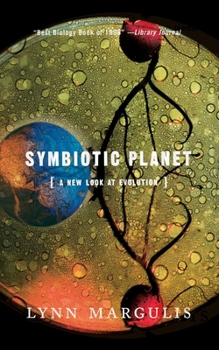Symbiotic Planet: A New Look at Evolution
(Part of the The Science Masters Series Series)
Select Format
Select Condition 
Book Overview
Although Charles Darwin's theory of evolution laid the foundations of modern biology, it did not tell the whole story. Most remarkably, The Origin of Species said very little about, of all things, the origins of species. Darwin and his modern successors have shown very convincingly how inherited variations are naturally selected, but they leave unanswered how variant organisms come to be in the first place. In Symbiotic Planet, renowned...
Format:Paperback
Language:English
ISBN:0465072720
ISBN13:9780465072729
Release Date:October 1999
Publisher:Basic Books
Length:176 Pages
Weight:0.43 lbs.
Dimensions:0.4" x 5.1" x 8.0"
Customer Reviews
5 ratings
I Highly Recommend
Published by Colton , 1 year ago
This book helped me understand life itself in a totally new way. There is some confusing jargon, and her writing skills leave some to be desired, but the topic is so profound that its definitely worth the read
It fits---it is as simple as that.
Published by Thriftbooks.com User , 21 years ago
"Symbiotic Planet" may sound to the average reader like just another attempt to "classify" life on our little Earth. This would be an error. This book, as is typical of Dr. Margulis' writing is precise, complete, and allows the reader to easily follow along this amazing journey through time and life itself. I have read, as well as reviewed a number of Dr. Margulis' books through the years, and stand in awe at how she can "break down" what to myself seems an incredibly complicated idea, into plain common examples. Her writing captivates the mind of the reader, to the point that it seems impossible to put down. I am a very slow reader-yet I finished the book (the first time) in a single day. One cannot stop reading it is just that fascinating! There is little I can say that would be nearly adequate to properly describe this book. The reader will decide for themselves that is really is a great read and a great book to keep as reference. It really is as simple as that.
Especially recommended for Margulis fans but not her best
Published by Thriftbooks.com User , 23 years ago
I am a great admirer of the author, who is one of the most creative biologists alive today, and a tireless popularizer of the brilliant and exciting ideas that define her career. For fans like me, this book is a must, as it offers tidbits about the author's life, including her marriage to Carl Sagan. It is also valuable in that it seeks to respond to criticisms of the Gaia hypothesis. But for those new to Margulis' work, I would recommend starting with Microcosmos, which she wrote with her son Dorion Sagan, a truly wonderful book that everyone interested in biology or the environment should have on their shelves. If Microcosmos doesn't grab you, don't bother with Symbiotic Planet. If it does grab you, then you'll probably want to go on to this book and others by Margulis.
Excellent summary with a few flaws
Published by Thriftbooks.com User , 24 years ago
Readable in a few hours, this book gives a quick introduction to a concept tremendously important to understanding the evolution on life on earth. I would have liked more extensive discussion of SET, with respect to the protoctists; the recognition of the development of these organisms from the symbiosis of various bacteria laid the groundwork for the understanding of symbiotic relationships in plants, animals, and fungi, which Margulis discusses in later chapters, yet the details of it take only a couple early chapters. Other volumes in this series are longer (some 170 pp.), and this one could have been, too. The clarification of "the Gaia hypothesis," in the last chapter, is very strong, and welcome; undergirding it is Margulis's insistence (throughout the book) on unsentimental and rigorous scientific thinking. The book does contain flaws. Editorial errors show a lack of careful proofreading (e.g., the date of the rediscovery of Mendel's work is given as 1990). Many sentences would have benefitted from more use of commas. More illustrations (e.g., of the structures of cells and organelles, mitosis, and meiosis) and summary equations for various metabolic processes, as well as a glossary, would make the book more accessible and useful to those who retain only a hazy knowledge (and that probably out-dated) of these things. Finally, Margulis takes too much the stance of the battered, then embraced and finally vindicated iconoclast, and seems rather too smug (as when she refers to "my SET theory"). It's just not attractive, and could have been toned down; it's obvious that she's brilliant. My criticisms, however, are relatively minor, and I recommend this book enthusiastically.
An superb book for all readers interested in life's origins.
Published by Thriftbooks.com User , 25 years ago
Lynn Margulis takes a decidedly personal approach in explaining her view on how the two theories she has been most devoted to in her career, serial endosymbiotic theory (SET) and GAIA, the interrelation of all things, are linked.Beginning with the smallest organisms, bacteria, all the way to the largest, the planet Earth, Margulis charts the way from the beginnings of life to current day thinking in symbiotic biology. Symbiosis, which is the biological term for the intimate and mutually rewarding pairing of two kinds of organisms, is critical to evolution. A reknowned expert in both SET and Gaia theories, Lynn Margulis writes with authority and persuasion on the subjects she knows best. Interspersed in her account is the evolution of her own professional life which allows the reader a glimpse into her mind. Called "one of the most successful synthetic thinkers in modern biology", (E.O. Wilson) Margulis invites the reader to think about the world and our place in it in a totally new way.





